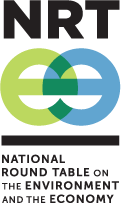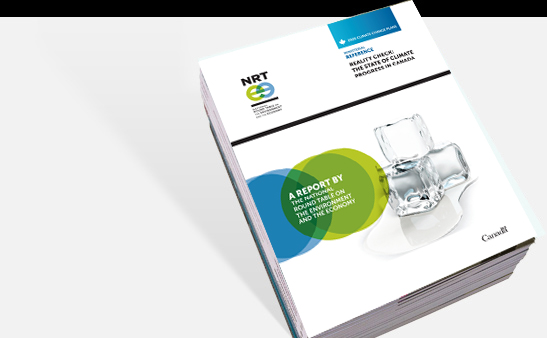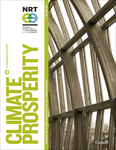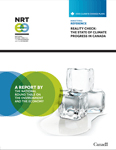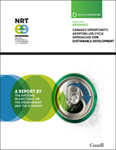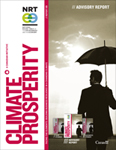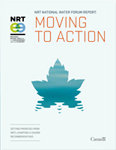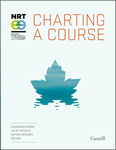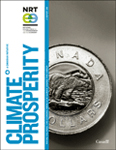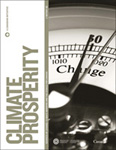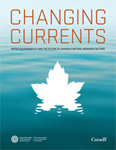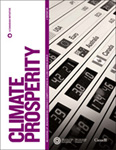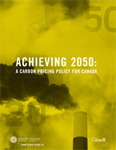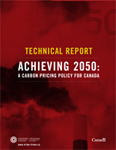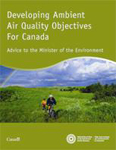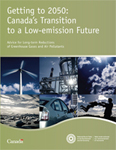NRTEE – 2010-2011 – Report on Plans and Priorities
The Honourable Jim Prentice
Minister of the Environment
Table of Contents
Message from the President and CEO
Section II –Analysis of Program Activities by Strategic Outcome
-
2.3 Program Activity: Advisory Program on Environment and Economy Issues
- 2.3.1 Generate Policy Advice
- 2.3.2 Review Stakeholders Engagement Processes
- 2.3.3 Strengthen the Strategic Outlook and Research Function
- 2.3.4 Comply With Bill C-288
- 2.3.5 Respond to Government References
- 2.3.6 Promote Advice
2.4 Program Activity: Internal Services
Section III – Supplementary Information
- 3.1 Summary of Capital Spending by Program Activity
- 3.2 Green Procurement
- 3.3 Other Items of Interest
- 3.4 NRTEE Contact Information
Message from the President and CEO
The National Round Table on the Environment and the Economy (NRTEE or Round Table) is an independent policy advisory body reporting to Parliament through the Minister of the Environment. The purpose of the Round Table, according to the NRTEE Act (1993), is “to play the role of catalyst in identifying, explaining, and promoting, in all sectors of Canadian society and in all regions of Canada, principles and practices of sustainable development.”
Drawing on the insight and experience of NRTEE members, the Round Table examines the environmental and economic implications of priority issues and offers independent advice on how to address them, with the ultimate goal of influencing federal policy development and decisions in other key sectors on these issues. Since its formation over 20 years ago, the NRTEE has established a reputation for working effectively in highly contentious areas and for providing independent, credible, and balanced advice.
The Round Table has established two major priorities for 2010–2011. First and foremost, the NRTEE will produce policy advisory reports from its two key research areas focusing on the economic impacts of climate change on Canada, and water sustainability and the future of the natural resources sectors. Second, the Round Table will explore how new collaborative engagement processes with government, stakeholders, and citizens can lead to improved sustainable development policies for Canada. We will use our findings from recent discussions with government, business, academic, and civic leaders to develop recommendations aimed at strengthening our outreach processes and, as a result, improving policy guidance to governments.
Ongoing priorities for the Round Table will include abiding by its legislated responsibilities under the Kyoto Protocol Implementation Act, responding to requests from government for research and policy advice on specific topics of concern, and identifying emerging issues for the future that may need study and advice.
Finally, the NRTEE will implement new communications and outreach practices designed to better inform governments, stakeholder groups and the public of its work and the advice it offers.
Our unique role as a knowledgeable, independent convener of views and information from across the spectrum of society has allowed us to make a substantial contribution to sustainable development and national prosperity. We are committed to assisting the Government of Canada, Parliament, and Canadians in continuing along this path.
_______________
David McLaughlin
President and CEO
Section I – Overview
1.1 Raison d’être and Responsibilities
The purpose of the National Round Table on the Environment and the Economy (NRTEE or Round Table) is to play the role of catalyst in identifying, explaining, and promoting, in all sectors of Canadian society and in all regions of Canada, principles and practices of sustainable development. The NRTEE interprets this broad mandate through a strategic focus on issues of national interest at the intersection of the environment and the economy. Through its work, the NRTEE strives to influence policy development and decisions on issues pertaining to the environment and economy. These promote economic prosperity for all Canadians while striving to preserve the environment for current and future generations.
Purpose
- undertaking research and gathering information and analyses on critical issues of sustainable development;
- advising governments on ways of integrating environmental and economic considerations into their decision-making processes and on global issues of sustainable development;
- advising those sectors and regions on ways of incorporating principles and practices of sustainable development into their activities;
- promoting the understanding and increasing public awareness of the cultural, social, economic and policy changes required to attain sustainable development; and
- facilitating and assisting cooperative efforts in Canada to overcome barriers to the attainment of sustainable development.
NRTEE Act, Section 4
Created in 1988 by the Prime Minister, the National Round Table on the Environment and the Economy is an independent national advisory body reporting to the federal government and Parliament through the Minister of the Environment. The Round Table had its status formalized in 1993 by an Act of Parliament, Bill C-72, An Act to establish the National Round Table on the Environment and the Economy (NRTEE Act).
The NRTEE is a departmental corporation (Financial Administration Act, Schedule II).
The work of the NRTEE is directed by the Round Table members drawing on their expertise and insight. The members are part-time Governor-in-Council appointees. They represent different regions of Canada and are distinguished leaders from business, labour, universities, public service, and environmental organizations.
A Secretariat in Ottawa, headed by a President and CEO, supports the members. The Round Table normally meets four times each year in plenary sessions where members discuss priorities and review and approve the work of the Secretariat.
General information about the NRTEE and its membership can be found on the agency’s website at www.nrt-trn.ca.
1.2 Strategic Outcome and Program Activity Architecture (PAA)
The NRTEE aims to achieve the following single strategic outcome: Federal policy development and decisions in other key sectors are influenced by advice on sustainable development issues pertaining to the environment and the economy.
This RPP is based on the Treasury Board-approved PAA shown in Figure 1 below.
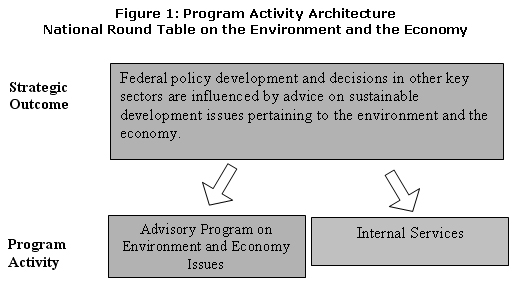
1.3 Planning Summary
1.3.1 Financial Resources ($ thousands)
The financial resources table below provides a summary of the total planned spending for the NRTEE for the next three fiscal years.
| 2010-11 | 2011-12 | 2012-13 |
|---|---|---|
| 5,243.3 | 5,248.5 | 5,248.5 |
1.3.2 Human Resources (Full-time Equivalent [FTE])
The Human Resources tables provide a summary of the total planned human resources for the NRTEE for the next three years.
| 2010-11 | 2011-12 | 2012-13 |
|---|---|---|
| 31 | 31 | 31 |
1.3.3 Planning Summary Table
| Performance Indicator | Target |
|---|---|
| Extent to which NRTEE advice is considered in policy decisions by federal decision makers | NRTEE advice is partly responsible for a number of policy decisions and is often considered in assessing relevant policy choices made by federal government policy makers. |
| Program Activity 1 | Forecast Spending 2009–10 ($ thousands) | Planned Spending ($ thousands) |
Alignment to Government of Canada Outcomes |
||
|---|---|---|---|---|---|
| 2010-11 | 2012-12 | 2012-13 | |||
|
Advisory Program on Environment and Economy Issues |
5,134.0 |
Strong Economic Growth |
|||
|
Internal Services |
|||||
| Total Planned Spending | 5,243.3 | 5,248.5 | 5,248.5 | ||
1.4 Alignment with Government of Canada Outcomes
In 2010–2011, the NRTEE will continue to contribute to the Government of Canada’s outcome of Strong Economic Growth by providing relevant research and policy advice on how Canada can address sustainable development issues in the medium and long term. The NRTEE’s advice, if implemented, is consistent with Canada’s national interest and the government’s objective of building a globally competitive, sustainable, technologically innovative economy that benefits all Canadians.
1.5 Contribution of Priorities to Strategic Outcome
For 2010–2011, the agency has identified two priority areas, one operational and one management, both of which contribute to the NRTEE’s single strategic outcome.
| Operational Priorities | Type | Links to Strategic Outcome | Description |
|---|---|---|---|
| To produce and promote advice to decision-makers on environment and economy issues |
Ongoing |
Federal policy development and decisions in other key sectors are influenced by advice on sustainable development issues pertaining to the environment and the economy. |
Timely, actionable, and relevant advice is essential to the NRTEE’s credibility and its ability to influence decision makers; dissemination and promotion of the advice is another essential component of its work. Plans for 2010–2011 include two key policy research areas:
(See Section 2 for additional information and other plans.) |
| Management Priorities | Type | Links to Strategic Outcome(s) | Description |
|---|---|---|---|
| To apply sound management practices in operations | Ongoing | Federal policy development and decisions in other key sectors are influenced by advice on sustainable development issues pertaining to the environment and the economy. |
Sound management enables the NRTEE to deliver its primary program activity. Key management plans for 2010–2011:
(See Section 2 for additional information.) |
1.6 Risk Analysis
1.6.1 Organizational Context
The Secretariat, headed by a President and CEO, provides program management, policy and research analysis, communications, and administrative services to the NRTEE.
Issues to be examined by the NRTEE are identified through an internal screening and scoping process, in which the final decisions reflect current policy, environmental, economic or political priorities together with NRTEE members’ combined interests. The NRTEE reinforces members’ expertise and advice with stakeholder consultation and original policy research undertaken or directed by the Secretariat, as part of its approach to conducting its work.
The NRTEE also responds to specific research requests from the federal government. In addition, the Round Table has a legislated responsibility to respond as per the Kyoto Protocol Implementation Act to the federal government’s annual Climate Change Plan within 60 days.
This annual reporting requirement exists until 2012.
1.6.2 Risks and Challenges
The NRTEE seeks to influence the government’s approach to important sustainable development issues. To accomplish this, the NRTEE must produce and promote relevant, neutral, credible advice in a timely manner. Its ability to do so is affected by both risks and challenges. These are discussed below.
- A key indicator of the NRTEE’s performance is its ability to influence government policy development. In Canada, particularly for the issues typically examined by the NRTEE, federal policy is not developed in isolation. It is affected by the government’s relationships with other Canadian and international jurisdictions and by a range of other factors over which the NRTEE has no control, creating a complex decision-making environment.
- The ability to influence government is a difficult performance indicator to measure. In addition to the challenge described above, the NRTEE’s influence on government decisions may translate into action only years after NRTEE’s reports and recommendations are published. Therefore, the causal effect may not always be clear.
- The NRTEE often casts its policy agenda forward as it deals with contentious sustainability issues, risking perceived asymmetry with current government agendas, time frames, and policy frameworks.
- The NRTEE currently has limitations on the amount of its budget it can spend on travel and hospitality for 2010–2011, even though this is central to its core business of stakeholder engagement and outreach with economic and environmental organizations and experts. Restrictions on allocating funds internally from existing budgets may limit the scope and scale of desired activities in this area, even though this would not result in an increase in the NRTEE’s overall budget.
- The members’ expertise and insight is critical in directing the research and analysis of the Round Table’s work. There is risk in having insufficient members and representation of interests, experience, and regional diversity unless appointments occur in a timely manner. Ongoing liaison with the Minister’s office on this issue, together with the existing orientation program for new members, can help address these challenges.
1.7 Expenditure Profile
The NRTEE’s overall financial resources and expenditures profile indicate only minor fluctuations over time, providing a stable platform for planning and delivery of activities, research, and reports.
1.8 Voted and Statutory Items
| Vote # or Statutory Item (S) | Truncated Vote or Statutory Wording | 2009-10 Main Estimates |
2010-11 Main Estimates |
|---|---|---|---|
| 20 | Operating expenditures | 4,732.0 | 4,825.8 |
|
(S) |
Contributions to employee benefit plans | 402.0 | 417.5 |
| Total | 5,134.0 | 5,243.3 | |
Section II – Analysis of Program Activities by Strategic Outcome
2.1 Strategic Outcome
The NRTEE has a single strategic outcome:
Federal policy development and decisions in other key sectors are influenced by advice on sustainable development issues pertaining to the environment and the economy.
The NRTEE’s approach to achieving its strategic outcome is to produce, disseminate, and promote policy advice about sustainable development challenges and opportunities; to increase the understanding of decision-makers of these; to inform the debate on current and emerging issues; and to endeavour to ensure that NRTEE advice is considered in policy decisions.
Target for 2010–2011: NRTEE advice is considered in assessing relevant policy choices made by federal government policy makers.
Performance indicator: A key indicator of the NRTEE’s performance is the extent to which federal government policy makers consider the NRTEE’s advice in federal policy decisions and use its research results when developing policy recommendations.
2.2 Program Activities (PA)
The NRTEE has two program activities under the Main Estimates:
- Advisory Program on Environment and Economy Issues
- Internal Services
Each will be described below in Sections 2.3 and 2.4. All the expected results from the Program Activities directly support the NRTEE’s two key priorities as well as the NRTEE’s single strategic outcome.
2.3 Program Activity: Advisory Program on Environment and Economy Issues
PA Description
Raising awareness and understanding among Canadians and their governments about the challenges of sustainable development and promoting viable solutions are vital to Canada’s environmental and economic future. Through this program, the National Round Table on the Environment and the Economy (NRTEE) strives to influence policy development and decision making on select sustainable development issues pertaining to the environment and the economy. The NRTEE conducts research and analysis and produces information and advice on selected sustainable development issues. The agency promotes its findings and recommendations through a variety of communications channels such as media relations, stakeholder briefings and other events, publications, and the agency website to influence policy and decisions of policy makers in the federal government and other key sectors such as other levels of government, industry, and non-government organizations across the country.
| Human Resources (FTEs) and Planned Spending ($ thousands) | |||||
|---|---|---|---|---|---|
| 2010-11 | 2011-12 | 2012-13 | |||
| FTEs | Planned Spending | FTEs | Planned Spending | FTEs | Planned Spending |
| 18 | 3,329.1 | 18 | 3,332.8 | 18 | 3,332.8 |
| Expected Results | Performance Indicators | Targets |
|---|---|---|
| Increased awareness and understanding | Level of awareness and understanding by federal decision-makers of NRTEE advice on selected issues | Decision-makers have high level of awareness of challenges and potential solutions proposed by the NRTEE. NRTEE is perceived as a leader, able to bring stakeholders together to discuss current and emerging issues. |
| Useful recommendations and advice | Usefulness of policy advice and recommendations |
Informed and regular contact with government decision-makers at all appropriate levels. Detailed policy briefings provided. Policy analysis is seen as relevant, timely, and useful. High stakeholder satisfaction. |
| Effective communication of recommendations | Quality and reach of external communications | High visibility with stakeholders. Communications reach wide range of target audiences. Broad range of communications products, perceived to be of high quality. Periodic media coverage, generally positive. |
| High quality research and consultations | Effectiveness of stakeholder consultation | Frequent consultation with stakeholders at national and regional levels. Consultations confirm high-quality NRTEE research and build support for policy advice. High level of participation in NRTEE events. Events are perceived to have high added value. |
Program Activity 1—Plans and Initiatives for 2010–2011 and Beyond:
2.3.1 Generate Policy Advice
The Round Table’s policy research and analysis will focus on two key initiatives:
The Economic Risks and Opportunities of Climate Change for Canada
In 2010–2011, this program will explore the economic risks and opportunities for Canada from the following climate change–related issues:
- the physical impacts of the changing climate
- domestic policies for climate change mitigation
- climate policies implemented by other countries
With respect to the physical impacts of climate change, the NRTEE will develop case studies to illustrate a range of economic risks while also providing an estimate of the net national cost of climate impacts including adaptation. The focus areas for the case studies will be forestry, coastal zones, human health, and public infrastructure.
From an international perspective, Canada will also face significant economic implications as the world, and especially its trading partners, transition to a low-carbon-emission economy. To this end, the NRTEE will complete a Canada-United States case study designed to explore the economic ramifications of how American and Canadian climate policy options might interact. An international benchmarking study will be released that assesses how Canada is currently positioned for low-carbon competitiveness, compared with its major trading partners on a range of indicators. The results will provide insight and advice for Canadian policy makers on how to strategically invest for future low-carbon competitiveness. As the world moves toward increased carbon mitigation, Canada is faced with short- and long-term decisions on the future of clean technologies, trade policies, skills development, and virtually every other aspect of its economy. Later program activities will explore opportunities in these and other areas and develop policy recommendations for Canada.
This project is expected to run until 2011–2012 and will be conducted through a phased approach with staged deliverables. The primary audience for this research will be governments, as they are responsible for policy design and implementation of climate change mitigation and adaptation. Secondary audiences include the private sector, which will be affected by policy design and implementation, as well as environmental groups and experts.
Water Sustainability and the Future of Canada’s Natural Resource Sectors
The sustainability of Canada’s agriculture, energy, forestry, and mining sectors is heavily dependent on the continued availability of water. Rising water consumption/use and the prospects of climate change are two key drivers that may potentially affect critical watersheds across the country, as well as the economic prosperity of Canada’s important natural resource sectors.
This program seeks to evaluate the best policies, approaches and mechanisms that governments, industry, and water management authorities can use to manage water and foster both ecosystem health and the various resource sectors’ economic sustainability.
The NRTEE’s work will explore these issues through a phased approach and take a forward-looking perspective in the reports and recommendations developed. Building on extensive consultations with industry and other stakeholders, a first report will be published in 2010, describing the key water issues for those sectors and highlighting areas for recommendations and action. The NRTEE will investigate those key issues further leading to the publication of a second report in this fiscal year, which will focus on policy recommendations to improve water management in Canada and foster long-term sector sustainability.
For more information go to: http://nrt-trn.ca/water/water-sustainability-and-the-future-of-canadas-natural-resource-sectors-2 .
2.3.2 Review Stakeholders Engagement Processes
Collaborative engagement is central to effective sustainability policy development. In 2010–2011, the NRTEE will build on recent roundtable discussions with high-level officials from federal, provincial and municipal governments, environmental and civil society organizations, business, and academia to strengthen its own policy engagement processes. This will lead to the development of ideas and strategies for improved consideration and engagement practices by the NRTEE and other government organizations, together with the implementation of collaborative processes enabling long-term policy solutions to complex areas such as sustainable development.
2.3.3 Strengthen the Strategic Outlook and Research Function
In 2010–2011, the NRTEE plans to further refine the basic strategic outlook function that was put in place in 2009–2010. The NRTEE seeks to gather information, research, and intelligence to identify emerging sustainability priority areas. The information and analysis emerging from this function will assist the NRTEE in planning its policy work and resource allocation on a more rational multi-year basis. A new occasional briefs program by NRTEE policy staff on technical policy matters will be instituted to strengthen our core research foundation.
2.3.4 Comply With Bill C-288
The NRTEE will comply with its legislated responsibilities under the Kyoto Protocol Implementation Act with respect to the government’s Climate Change Plan and Statement. In order to carry out its statutory obligations, the NRTEE will undertake research, gather information, and produce a written response as required within the mandatory time frame.
2.3.5 Respond to Government References
The NRTEE recognizes the importance of responding to government “references” or requests for advice on specific issues and will do so as required.
2.3.6 Promote Advice
Promoting the research and policy advice of the Round Table is essential to raising awareness and influencing government. The NRTEE promotes its advice through media relations, its website, direct electronic distribution to stakeholders, as well as by undertaking outreach activities, speaking engagements, and collaborative activities with non-governmental sectors, stakeholders, academia, and other organizations. Each targeted audience and activity is critical to the agency’s efforts to reinforce its reputation as a credible and trustworthy source of research and advice.
Enhance Stakeholder Communications Activities
In 2010–2011, the NRTEE will continue its extensive briefings and stakeholder engagement on its ongoing work. These activities will be part of a targeted effort to increase the level of awareness and understanding of its recommendations and advice by federal decision makers and national stakeholders, with the ultimate goal of influencing policy development on the issues addressed. The meetings provide a forum to present the NRTEE’s advice and also to hear from stakeholders. This exchange of ideas is important for ensuring that the advice is useful and relevant; it also assists in framing future possible work on specific issues.
The agency will continue its efforts to improve the reach of its advice and influence through increased contacts with government, the media, NGOs, stakeholders, and others. By increasing its visibility, the NRTEE plans to raise its profile with the public and, in turn, strengthen its influence with various levels of government. The NRTEE will reinforce its efforts to more broadly communicate its role as a public policy advisor, and will utilize its various members to give voice to that message.
Improve Strategic Communications
NRTEE strategic communication efforts will focus on efforts to present the organization as an informed, independent, and reliable source for policy advice on sustainable development issues. This will be accomplished principally through the publication of the Round Table’s policy reports. These reports are informed by meetings with, and by research derived from, leading experts and stakeholders from across the country. Agency spokespersons and members will also make themselves available to comment on areas touching on the NRTEE’s mandate. The NRTEE will persist in efforts to improve its website and increasingly utilize digital media to disseminate its message. In order to further enhance its ability to influence decision makers, the NRTEE will research perceptions about its current brand and identity with major stakeholders and integrate results into its strategic communications activities.
Key Communications Messages for 2010–2011
The NRTEE is:
- A leading national public policy organization that offers critical advice on how best to integrate environmental and economic concerns as part of sustainable development.
- A credible and trustworthy source of policy guidance, thanks to its original research and reliance on input from experts and interests.
- A trusted, neutral space to discuss issues and solutions affecting sustainable development.
- A catalyst for needed public policy ideas in sustainable development.
2.4 Program Activity: Internal Services
| Financial Resources ($ thousands) | Human Resources (FTEs) | |||||
|---|---|---|---|---|---|---|
| 2010-11 | 2011-12 | 2012-13 | 2010-11 | 2011-12 | 2012-13 | |
| 1,914.2 | 1,915.7 | 1,915.7 | 13 | 13 | 13 | |
Program Activity 2—Plans and Initiatives for 2010–2011 and Beyond:
2.4.1 Enhance Information Technology Infrastructure
The NRTEE plans to invest in and migrate its network infrastructure to a virtualized environment, resulting in security, medium-term cost savings, and “greener” operations by using less energy.
2.4.2 Overhaul the NRTEE Database
The NRTEE database serves as a key tool in communicating with stakeholders and clients. The existing database is over 10 years old and is no longer adequate to meet the needs of the organization. It will be reconfigured and updated to facilitate more efficient and effective communication and engagement with key NRTEE audiences.
2.5 Performance Measurement in 2010–2011
The NRTEE’s Performance Measurement Framework and the Management Resources and Results Structure have been used as the basis for identifying the expected results and indicators for 2010–2011.
Key data sources for populating the framework are as follows:
- Feedback from federal decision-makers and national stakeholders (based on biannual surveys)
- Feedback provided by participants after NRTEE consultation sessions
- Operational data related to communications and overall management of the NRTEE
- Results from branding and identity engagement with stakeholders
The NRTEE plans to monitor the usefulness and relevance of the various elements of the framework and to make adjustments as required to ensure their ongoing value to management for planning and decision making.
2.6 Benefits for Canadians
The NRTEE benefits Canadians by addressing an issue of critical importance to Canada’s long-term prosperity and quality of life, namely sustainable development. The agency provides forward recommendations to decision-makers with the ultimate goal of influencing policy on issues at the nexus of the environment and the economy. These recommendations, if implemented, are consistent with Canada’s national interest and the government’s objective of building a globally competitive, sustainable, technologically innovative economy.
Section III – Supplementary Information
All electronic supplementary information tables found in the 2010–11 Report on Plans and Priorities can be found on the Treasury Board of Canada Secretariat’s website at http://www.tbs-sct.gc.ca/rpp/2010-2011/info/info-eng.asp
3.1 Summary of Capital Spending by Program Activity
3.2 Green Procurement
3.3 Other Items of Interest
Round Table Members
(At December 31, 2009; subject to change during the year)
NRTEE Chair
Robert Page
TransAlta Professor of Environmental Management and Sustainability
Institute for Sustainable Energy, Environment and Economy
University of Calgary
Calgary, Alberta
Elizabeth Brubaker
Executive Director
Environment Probe
Toronto, Ontario
The Honourable Pauline Browes, P.C.
Director, Waterfront Regeneration Trust
Toronto, Ontario
Angus Bruneau
Corporate Director
St. John’s, Newfoundland and Labrador
Dianne Cunningham
Director, Lawrence National Centre for Policy Management
Richard Ivey School of Business
University of Western Ontario
London, Ontario
Anthony Dale
Vice President, Policy and Public Affairs
Ontario Hospital Association
Toronto, Ontario
Francine Dorion (NRTEE Vice Chair)
St-Bruno-de-Montarville, Québec
John V. Hachey
Lachine, Québec
Tim Haig
President and CEO, BIOX Corporation
Oakville, Ontario
Christopher Hilkene
President, Clean Water Foundation
Toronto, Ontario
Franklin A. Holtforster
President and CEO
MHPM Project Managers Inc.
Toronto, Ontario
Donald F. MacKinnon
President
Power Workers’ Union
Toronto, Ontario
Ken McKinnon
Chair, Yukon Environmental and Socio-Economic Assessment Board
Whitehorse, Yukon
Robert (Bob) Mills
International Advisor, Globe International
Senior Advisor, Plasco Energy Group
Red Deer, Alberta
Richard Prokopanko
Director, Government Relations
Rio Tinto Alcan Inc.
Vancouver, British Columbia
Wishart Robson
Climate Change Advisor
Nexen Inc.
Calgary, Alberta
Robert Slater (NRTEE Vice Chair)
Adjunct Professor
Environmental Policy, Carleton University
Ottawa, Ontario
3.4 NRTEE Contact Information
Jim McLachlan
Director, Corporate Services
344 Slater Street, Suite 200
Ottawa, ON K1R 7Y3
Tel: 613-947-4507
1 Treasury Board Secretariat approved program activity, please access the Main Estimates online at http://www.tbs-sct.gc.ca/est-pre/20092010/me-bd/EC-eng.asp#bm03
